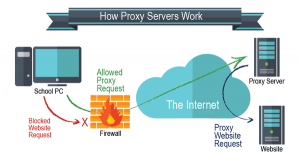Introduction
Welcome to the world of proxy servers, where you can unlock a whole new level of online browsing freedom. In this digital era, where privacy and security are paramount, proxy servers have become a valuable tool for internet users around the globe. Whether you want to access geo-restricted content, browse anonymously, or protect your online identity, a proxy server can help you achieve these goals.
But what exactly is a proxy server? How can you find free proxy servers to meet your needs? In this article, we will explore the world of proxy servers and provide you with valuable insights on how to get free proxy servers.
A proxy server acts as an intermediary between your device and the internet. When you connect to the internet through a proxy server, your requests are first sent to the server, which then forwards them to the target website or server on your behalf. This process helps to mask your IP address, making it appear as if your requests are coming from the proxy server rather than directly from your device.
Using a proxy server offers numerous benefits. One of the key advantages is the ability to bypass geo-restrictions. If you ever encountered the frustrating message “This content is not available in your country,” a proxy server can grant you access to that content by routing your connection through a server located in a region where the content is accessible.
Additionally, proxy servers provide a layer of anonymity for your online activities. By concealing your IP address, they make it difficult for websites or online services to track your location and gather information about your browsing habits. This can be particularly useful when you want to protect your privacy or avoid targeted advertisements.
In the next sections, we will guide you through different methods of finding free proxy servers. Although there are paid options available, we will focus on free alternatives to help you get started on your proxy server journey. So, let’s dive in and explore these methods in detail.
What is a Proxy Server?
A proxy server acts as an intermediary between your device and the internet. When you connect to the internet through a proxy server, your requests are first sent to the server, which then forwards them to the target website or server on your behalf. This process helps to mask your IP address, making it appear as if your requests are coming from the proxy server rather than directly from your device.
Proxy servers can be categorized into different types based on their functionality and how they handle requests. Here are a few common types:
- Forward Proxy: A forward proxy is the most commonly used type of proxy server. It sits between your device and the internet, forwarding your requests to the web server. It acts on behalf of the client and may add additional headers or modify the request before sending it to the server. Forward proxies are typically used to improve performance, cache content, or control internet access within an organization.
- Reverse Proxy: Unlike a forward proxy, a reverse proxy sits in front of web servers and acts on behalf of the server, intercepting and distributing client requests to the appropriate servers. Reverse proxies are often used to distribute incoming traffic, improve scalability, and provide additional security measures by filtering and inspecting requests before they reach the servers.
- Transparent Proxy: A transparent proxy, as the name suggests, operates without the knowledge of the client or server. It intercepts traffic without modifying it and doesn’t require any additional configuration on the client side. Transparent proxies are commonly used by internet service providers (ISPs) to cache content and improve network performance.
- Anonymous and Elite Proxy: These types of proxy servers focus on anonymity and security. Anonymous proxies hide your IP address, making it difficult for websites or services to track your online activities. Elite proxies offer even higher anonymity and security by not revealing that they are proxy servers at all.
In addition to providing anonymity and masking your IP address, proxy servers offer other benefits. They can help you bypass network restrictions and access geo-restricted content by routing your connection through a server located in a region where the content is accessible. Proxy servers can also improve internet speed, as they can cache frequently accessed content and reduce the amount of data that needs to be transferred.
Now that you have a better understanding of what a proxy server is and how it functions, let’s move on to the next section and explore the benefits of using a proxy server.
Benefits of Using a Proxy Server
Using a proxy server offers a range of benefits for internet users. Whether you’re concerned about your online privacy, need to access geo-restricted content, or want to enhance your browsing experience, a proxy server can help fulfill these requirements. Here are some key benefits of using a proxy server:
- Anonymity and Privacy: One of the primary reasons people use proxy servers is to protect their online privacy. By masking your IP address, proxy servers make it difficult for websites or services to track your location and gather information about your browsing habits. This added layer of anonymity can help safeguard your personal data and protect your privacy online.
- Access Geo-Restricted Content: Proxy servers can be used to access region-restricted content on the internet. By connecting to a server located in a different region, you can bypass geo-restrictions and access websites, streaming services, or online platforms that might otherwise be unavailable in your area. This is particularly useful for users who want to watch region-specific content or access online services available only in certain locations.
- Enhanced Security: Proxy servers can provide an additional layer of security when browsing the internet. They act as a barrier between your device and the websites or services you connect to, filtering and inspecting incoming and outgoing traffic. Proxy servers can help identify and block potentially harmful or malicious websites, protecting your device from malware, viruses, and cyber threats.
- Improved Performance: Proxy servers can help improve internet speed by caching frequently accessed content. When you request a webpage or file, the proxy server can store a copy of it and deliver it to you directly without having to retrieve it from the original server again. This caching mechanism can reduce the load on the network and improve the overall performance of your browsing experience.
- Control and Monitoring: Proxy servers can be utilized by organizations to control and monitor internet access for their employees. By configuring proxy settings, organizations can filter and restrict access to certain websites or types of content, ensuring that employees adhere to the company’s internet usage policies. Proxy servers can also provide detailed logs and reports on internet usage, allowing administrators to monitor and analyze network traffic.
These are just a few of the many benefits that proxy servers offer to internet users. Whether you’re looking to maintain your privacy, access content from different regions, enhance security, or improve internet performance, using a proxy server can be a valuable tool in achieving these goals. Now that you understand the benefits, let’s explore how to find free proxy servers in the next section.
Finding Free Proxy Servers
Now that you recognize the benefits of using a proxy server, the next step is to find free proxy servers that meet your requirements. There are several methods you can employ to discover these servers, and in this section, we will explore some of the most effective approaches:
- Checking Proxy Server Lists: Many websites curate lists of free proxy servers, categorizing them by location, speed, and other parameters. These lists are frequently updated, providing you with a wide range of options to choose from. Simply browse through these lists and select the proxy servers that fit your needs.
- Using Proxy Server Websites: Some websites act as intermediaries, allowing you to connect to the internet through their proxy servers. They often provide a user-friendly interface through which you can access and use these servers. These websites may offer various features, such as encryption, ad-blocking, and the ability to choose servers from different locations.
- Utilizing Proxy Server Software: There are numerous proxy server software solutions available, both free and paid. These software tools allow you to set up and manage your own proxy server on your computer or local network. By using such software, you have full control over the server and can customize it to meet your specific requirements.
- Searching on Social Media Platforms: Social media platforms, such as Twitter and Reddit, can be valuable resources for finding free proxy servers. Many users share their proxy server findings and recommendations on these platforms. By searching for relevant hashtags or browsing through dedicated communities, you can discover proxy servers that others have found useful.
- Joining Online Proxy Server Communities: There are online communities and forums dedicated to discussing proxy servers, where users share their experiences and provide recommendations. By joining these communities, you can gain insights from proxy server enthusiasts and access valuable resources, such as lists of reliable and high-performance proxy servers.
- Requesting Proxy Servers from Friends or Experts: Personal networks can also be a valuable source of free proxy servers. Reach out to friends, colleagues, or experts in the field and ask for their recommendations. Those who have experience with proxy servers might be able to provide you with reliable options or guide you towards trustworthy sources.
- Testing the Reliability and Security of the Proxy Server: Once you have found potential free proxy servers, it is crucial to test their reliability and security before fully relying on them. Check their speed, stability, and availability. Additionally, ensure they have proper security measures in place to protect your data and privacy.
By employing these various methods, you can uncover numerous free proxy servers that cater to your specific needs. Remember to evaluate and compare the features, performance, and security aspects of different servers to find the ones that best suit your requirements. Now that you have learned how to find free proxy servers, let’s wrap up the article in the concluding section.
Checking Proxy Server Lists
One of the most common methods of finding free proxy servers is by checking proxy server lists. These lists are readily available on various websites and provide a collection of proxy servers categorized by location, speed, protocol, and other parameters. Here’s how you can utilize proxy server lists to find the right servers for your needs:
- Research Reliable Websites: Start by researching and identifying reputable websites that curate and update proxy server lists regularly. Look for websites that have positive reviews, high user ratings, and a history of providing accurate and reliable information.
- Browse through Proxy Server Lists: Once you’ve identified reliable websites, explore their proxy server lists. These lists typically provide details such as the IP address, port number, server location, protocol, and anonymity level of each proxy server. Some lists may also include additional information like connection speed and uptime.
- Filter and Sort: Use the filtering and sorting options provided by the website to narrow down the list of proxy servers based on your preferences. You can filter servers by country, protocol, anonymity level, and other criteria to find servers that align with your specific requirements.
- Quality and Reliability: While browsing the proxy server lists, pay attention to user reviews, ratings, and feedback. Look for servers that have positive reviews and high ratings, as it indicates that those servers are more likely to be reliable and provide a good browsing experience.
- Testing: After selecting a few proxy servers from the list, it’s crucial to test their performance before fully relying on them. Use online tools that measure the speed and stability of the proxy servers to ensure they meet your expectations. Additionally, test the availability of the servers at different times to verify their reliability.
- Regular Updates: Proxy server lists should be regularly updated to ensure that the listed servers are still active and functional. Check if the website provides recent updates and maintains an active community of users who report any issues or provide new proxy server recommendations.
By checking proxy server lists, you can quickly discover a wide range of free proxy servers that meet your requirements. However, it’s important to note that not all servers listed on these websites may be reliable or secure. Always exercise caution and thoroughly test the servers before using them for sensitive tasks or sharing personal information. Now that you’ve explored the first method of finding free proxy servers, let’s move on to the next method in the following section.
Using Proxy Server Websites
Another effective method to find free proxy servers is by utilizing proxy server websites. These websites act as intermediaries, allowing you to connect to the internet through their proxy servers. Here’s how you can make use of proxy server websites to access free proxies:
- Research Reliable Proxy Server Websites: Start by researching and identifying trusted proxy server websites. Look for websites with positive reviews, a user-friendly interface, and a good track record of providing reliable proxy server services.
- Visit Proxy Server Websites: Once you’ve identified reliable websites, visit their platforms or web pages. Many proxy server websites offer a user-friendly interface where you can enter the URL of the website you want to access anonymously.
- Choose Proxy Server Location and Features: Proxy server websites often allow you to select the location of the proxy server you want to use. This feature can be useful if you want to access content that is geographically restricted. Some websites even offer additional features such as encryption, ad-blocking, and the ability to choose servers based on their speed or protocol.
- Enter Website URL: Enter the URL of the website you wish to visit into the provided field on the proxy server website. The proxy server will then fetch the content from the website and display it to you.
- Ensure Website Compatibility: Keep in mind that not all websites may be fully compatible with proxy server websites. Some websites may detect the use of proxies and restrict access. In such cases, try different proxy servers or alternative methods to access the desired content.
- Verify Security Measures: Before using proxy server websites, ensure that they have proper security measures in place. Look for websites that use HTTPS protocols to protect your data transmission and employ encryption techniques to safeguard your anonymity.
- Explore Additional Features: Proxy server websites may provide additional features like URL encryption, cookie management, and scripts blocking. Familiarize yourself with these features and utilize them to further enhance your browsing experience and protect your privacy.
Using proxy server websites can provide a convenient and hassle-free way to access free proxy servers. However, keep in mind that the availability and reliability of these servers may vary. It’s advisable to test the performance and stability of the servers before using them for sensitive tasks or sharing personal information. Now that you’ve learned the second method of finding free proxy servers, let’s proceed to the next method in the upcoming section.
Utilizing Proxy Server Software
If you want more control and flexibility over your proxy server setup, utilizing proxy server software can be an excellent option. This method allows you to set up and manage your own proxy server on your computer or local network. Here’s how you can utilize proxy server software to access free proxy servers:
- Research Proxy Server Software: Start by researching and identifying proxy server software solutions that align with your requirements. Look for software that is compatible with your operating system, provides the features you need, and has good user reviews and ratings.
- Download and Install the Software: Once you’ve identified suitable proxy server software, download it from the official website or trusted sources. Follow the installation instructions provided by the software to set it up on your computer or network.
- Configure Proxy Server Settings: After installation, configure the proxy server settings according to your preferences. You can specify parameters such as port number, address filtering, logging, and authentication methods. Proxy server software typically offers an intuitive interface to make configuration easy for users.
- Choose Proxy Server Type: Depending on your needs, you can choose from various proxy server types, such as HTTP, HTTPS, SOCKS, or FTP proxies. Each type has its own purposes and functionalities, so select the appropriate one for your intended use.
- Connect to the Proxy Server: Once you have configured the proxy server software, connect your device or network to the proxy server. Update the proxy settings on your web browser or operating system to direct all your internet traffic through the designated proxy server.
- Test and Monitor: It’s crucial to test the performance and reliability of your proxy server after setup. Monitor the server logs, check for any error messages, and ensure that it’s functioning as expected. Regularly monitor the server’s performance to identify and address any issues that may arise.
- Search for Free Proxy Server Lists: To access free proxy servers, search for proxy server lists online. Many websites offer comprehensive lists of free proxy servers that you can use to enhance your browsing experience.
- Evaluate and Test Free Proxy Servers: Once you have found free proxy servers, evaluate their performance, reliability, and level of security. Test them with different websites and applications to ensure they meet your requirements.
Utilizing proxy server software allows you to have full control over your proxy server setup and tailor it to your specific needs. However, it’s essential to regularly update and maintain the software to ensure it remains secure and effective. Now that you’ve learned about using proxy server software, let’s move on to the next method in the following section.
Searching on Social Media Platforms
Social media platforms can serve as valuable resources for finding free proxy servers. Users often share their proxy server findings and recommendations on platforms like Twitter, Reddit, and online forums. Here’s how you can search on social media platforms to discover free proxy servers:
- Identify Relevant Social Media Platforms: Start by identifying social media platforms that are known for proxy server discussions and recommendations. Twitter and Reddit are popular platforms where users actively share and discuss proxy servers. Online forums and communities dedicated to technology or privacy topics can also be fruitful sources of information.
- Search Relevant Hashtags: Use relevant hashtags like #ProxyServers, #FreeProxy, or #ProxyRecommendations to find posts and discussions related to free proxy servers. These hashtags are commonly used by users seeking or sharing proxy server recommendations.
- Browse Proxy Server Subreddits: Reddit has dedicated subreddits, such as r/Proxy and r/ProxyAdvice, where users discuss and share their experiences with proxy servers. Browse through these subreddits and look for posts and comments that mention free proxy servers.
- Explore Technology and Privacy Forums: Join online forums and communities that focus on technology, privacy, or internet security. These forums often have dedicated sections or threads where users discuss and recommend free proxy servers. Participate in the discussions and ask for recommendations if needed.
- Follow Influential Users: Follow influential users who specialize in technology, internet security, or privacy-related topics. These users often share their knowledge and expertise on proxy servers and may provide valuable recommendations or insights.
- Engage in Discussions: Engage in discussions and ask for recommendations from the social media community. Share your requirements and specific needs, and ask for suggestions on reliable and free proxy servers. Users who have experience with proxy servers will often be willing to share their knowledge and help you find suitable options.
- Verify Recommendations: It’s important to verify the recommendations you find on social media platforms. Check the reputation and credibility of the users sharing the recommendations, and research the recommended proxy servers to ensure they meet your requirements for reliability, security, and performance.
Searching on social media platforms can provide you with real-time insights and recommendations from users who have first-hand experience with free proxy servers. However, exercise caution and verify the recommendations to ensure the proxies you choose are trustworthy and secure. Now that you’ve explored the method of searching on social media platforms, let’s move on to the next method in the following section.
Joining Online Proxy Server Communities
Joining online proxy server communities can be a valuable way to discover and share information about free proxy servers. These communities consist of individuals with a shared interest in proxy servers, and they often provide a platform for members to discuss, recommend, and exchange knowledge about proxy servers. Here’s how you can benefit from joining online proxy server communities:
- Identify Relevant Communities: Start by identifying online communities and forums that focus on proxy servers. Look for websites, forums, or social platforms dedicated to proxy servers or internet security topics. Common examples include Proxy Server Forums, Proxy Server Subreddits, or technology-related Facebook or LinkedIn groups.
- Join Communities: Once you’ve identified relevant communities, join them by creating an account on the respective platform or by following the necessary membership procedures. Familiarize yourself with the community rules and guidelines to ensure proper participation.
- Engage in Discussions: Participate actively in discussions within the community. Share your experiences, ask for recommendations for free proxy servers, and contribute by sharing relevant information. Engaging with the community will not only help you gain knowledge but also build relationships with fellow proxy server enthusiasts.
- Seek Recommendations: Seek recommendations from other community members. Describe your specific requirements, such as desired server location, protocol, or level of anonymity. Community members who have experience with free proxy servers will often be willing to provide recommendations based on their own experiences.
- Exchange Information: Share valuable information about the proxy servers you have used. If you come across reliable and free proxy servers, inform the community about them. Similarly, if you encounter any issues or discover proxy servers that are no longer functional, alert the community, helping others avoid potentially unreliable servers.
- Stay Updated: Regularly visit the community platform to stay updated on the latest discussions and recommendations. Proxy server communities can provide a wealth of information, including new proxy server discoveries, server performance updates, and security insights.
- Verify Recommendations: Before utilizing any recommended free proxy servers, verify their reliability, security, and performance. Perform your due diligence by researching the suggested servers and user recommendations to ensure they align with your requirements.
Joining online proxy server communities not only allows you to discover free proxy servers, but it also provides an opportunity to interact with like-minded individuals and expand your knowledge in the field. Always remember to contribute actively, be respectful of other community members, and follow the community guidelines. With this method explored, let’s move on to the next method in the following section.
Requesting Proxy Servers from Friends or Experts
Another effective method to find free proxy servers is by reaching out to friends, colleagues, or experts who have knowledge of proxy servers. These individuals can provide valuable recommendations and insights based on their experiences. Here’s how you can request proxy servers from friends or experts:
- Identify Friends or Experts: Identify individuals in your personal and professional network who have experience or knowledge of proxy servers. They can be tech-savvy friends, colleagues, or experts in the field.
- Reach Out for Recommendations: Contact the identified individuals and explain your need for free proxy servers. Specify your requirements, such as server locations, security features, or anonymity levels, to help them provide more targeted recommendations.
- Ask for Their Experiences: Inquire about their personal experiences with proxy servers. Ask about the servers they have used, their reliability, performance, and any specific features that stood out. Their insights can guide you in finding reliable and high-performance free proxy servers.
- Request Recommendations: Ask your friends or experts to recommend specific proxy servers that they found useful. Request any relevant details, such as server addresses, port numbers, or configuration settings, which will help you set up and utilize the recommended servers.
- Consider their Expertise: Experts in the field can provide comprehensive recommendations based on their industry knowledge and experience. Consider the expertise of the individuals you are reaching out to as it can significantly influence the quality and reliability of their recommendations.
- Research the Recommended Servers: After receiving recommendations, conduct your own research on the suggested proxy servers. Verify their reliability, security measures, and performance by checking user reviews, performance testing tools, and online resources.
- Express Your Gratitude: Once you have tested and started using the recommended free proxy servers, don’t forget to express your gratitude to your friends or the experts who provided the recommendations. Showing appreciation for their assistance strengthens your network and fosters relationships.
Requesting proxy servers from friends or experts allows you to tap into their knowledge and benefit from their experiences. Their firsthand recommendations can save time and effort in finding reliable free proxy servers. Remember to reciprocate the help whenever you can and continue to foster valuable relationships within your network. With this method understood, let’s move on to the next method in the following section.
Testing the Reliability and Security of the Proxy Server
Once you have found potential free proxy servers, it is crucial to test their reliability and security before fully relying on them. Testing allows you to assess the performance, stability, and level of security provided by the proxy servers. Here are some key considerations for testing the reliability and security of the proxy server:
- Testing Connection Speed: Use online tools or websites that measure the speed of proxy servers. Compare the performance of different servers and choose ones that offer satisfactory speed for your browsing needs.
- Checking Server Stability: Test the stability of the proxy servers by using them consistently over a period of time. Monitor for any drops in connection, frequent disconnections, or slow response times. A stable proxy server is crucial for uninterrupted browsing experience.
- Verifying Uptime: Look for proxy servers that have high uptime, ensuring that they are available and operational most of the time. Proxy servers with frequent downtime can negatively impact your browsing experience.
- Evaluating Security measures: Research the security measures employed by the proxy servers. Check if they offer encryption and support secure protocols like HTTPS. Assess the server’s reputation for protecting user privacy and ensuring data confidentiality.
- Checking Logs and Privacy Policy: Examine the proxy server’s privacy policy and logging practices. Ensure that they do not store or track sensitive information about your browsing activities. Look for servers that prioritize user privacy and have clear policies regarding data retention.
- Bypassing Geo-restrictions: Test the proxy server’s ability to bypass geo-restrictions by accessing content that is regionally restricted. Make sure the server successfully allows you to access websites and services that are otherwise blocked in your location.
- Checking Compatibility: Test the compatibility of the proxy server with different websites, platforms, and applications. Ensure that the server works well with the services you intend to use and does not cause any functionality or compatibility issues.
- Monitoring Network Traffic: Monitor the network traffic generated by the proxy server to ensure there are no suspicious or malicious activities. Use network monitoring tools to analyze the traffic and identify any potential threats or anomalies.
By thoroughly testing the reliability and security of the proxy servers, you can make informed decisions and select the most suitable ones for your browsing needs. Remember to regularly assess the performance and security of the chosen proxy servers to ensure they continue to meet your requirements over time. With this step completed, you now have a well-rounded understanding of how to find free proxy servers. Let’s wrap up the article in the concluding section.
Conclusion
Proxy servers offer a valuable solution for enhancing online privacy, accessing geo-restricted content, and improving internet performance. In this article, we explored various methods of finding free proxy servers to meet your browsing needs. We discussed checking proxy server lists, utilizing proxy server websites, using proxy server software, searching on social media platforms, joining online proxy server communities, requesting proxy servers from friends or experts, and testing the reliability and security of the proxy servers.
Checking proxy server lists allows you to browse through comprehensive listings and filter based on your preferences. Proxy server websites serve as intermediaries, providing an easy-to-use platform to connect to the internet through their servers. Proxy server software offers complete control and flexibility, allowing you to set up and manage your own proxy server. Searching on social media platforms and joining online proxy server communities provide real-time insights and recommendations from other users with similar interests.
Additionally, requesting proxy servers from friends or experts allows you to tap into their knowledge and experience. And finally, testing the reliability and security of proxy servers is crucial to ensure they meet your requirements for speed, stability, and data privacy.
Remember, while free proxy servers can offer numerous benefits, it’s important to exercise caution and verify their reliability, security, and performance before relying on them for sensitive tasks or sharing personal information. Regularly monitor and evaluate the chosen proxy servers to ensure they continue to meet your needs.
With the knowledge gained from this article, you are well-equipped to embark on your journey of finding and utilizing free proxy servers. Whether you’re looking to protect your privacy, access restricted content, or improve your overall browsing experience, proxy servers can play a pivotal role in achieving these goals. Embrace the power of proxy servers and enjoy a safer, more personalized online experience.

























